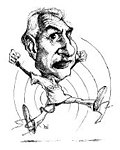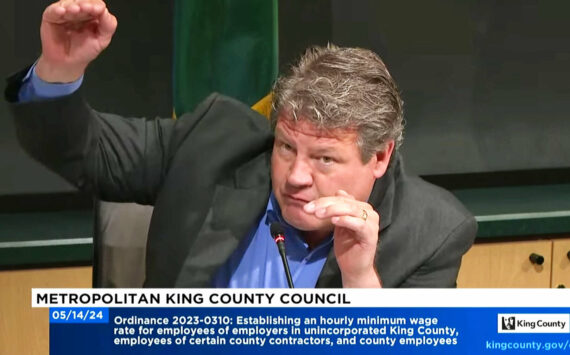SOUNDING VERY MUCH like someone positioning herself for a run for mayor, departing Seattle City Council member Tina Podlodowski rammed her hard-nosed anti-noise ordinance through the council last Monday, blasting objections by weak-kneed liberal male colleagues out of the air like so many clay pigeons.
In the end, Podlodowski’s legislative blitzkrieg ran out of steam in a morass of amendments so deep that by week’s end the city clerk still hadn’t managed to extract a version all members could agree on. But by that time it didn’t matter because, whatever the council had or had not passed, Mayor Paul Schell was planning to veto it. Or was he?
The groundwork for this curious lesson in civics Seattle-style was laid back in April, when Podlodowski persuaded council president Sue Donaldson that noise is not just an annoyance but a health hazard, hence an issue belonging in the Public Safety, Health and Technology Committee she chairs.
Everyone agrees that the city’s current anti-noise ordinance is overripe for revision. Under the present 1977 law, a noise offender would have to formally refuse to cease making a racket before a police officer could write a citation, making the ordinance useless in preventing most kinds of intermittent nuisance noise: loud parties, raucous music, overamplified street demos, etc.
The draft law that emerged from committee back in June was as fierce as its predecessor was toothless. Most notable were the provisions authorizing police to cite property owners for producing sounds “loud and raucous and frequent, repetitive or continuous which unreasonably disturb or unreasonably interfere with the peace, comfort, or repose of another.” If that wasn’t bad enough, it makes criminal any sounds at all, as long as they are “plainly audible”—and guess who gets to decide what that pair of words means.
Should citation for a crime worthy of a $1,000 fine, loss of business license, and six months in the pokey really be made to depend on a single cop’s unaided ears? Defenders of the ordinance say it’s no different from the laws that allow an officer to write a ticket for careless driving and make it stick in front of a magistrate on their unsupported say-so. Opponents point out that careless driving kills people; noise, however annoying, doesn’t. Introducing her bill, Podlodowski’s response was to cite heartrending testimony before her committee from people whose very health had been shattered by noise which kept them from sleeping—”literally for weeks.” When council members Nick Licata and Peter Steinbrueck protested the indefensible vagueness of the “plainly audible” standard, Podlodowski assured them almost smugly that her research showed that similar laws in other cities had been made to stick.
Given the council majority for any measure that protects the quality of life of those well-off enough to deserve one, the original ordinance might have passed had it not been blindsided by one of its fans: Margaret Pageler, zealous to secure the sleep of the righteous from voices of dissent. Pageler demanded—and got—an affirmative vote on an amendment to limit (unamplified) picketing and protesting to 7am (9am on weekends) to 10pm.
Even as they voted for it, some of Podlodowski’s carefully crafted majority—herself, Pageler, Martha Choe, Sue Donaldson, and Richard Conlin—began to realize that Pageler’s restriction on demos was taking them onto thin ice legally. A flurry of softening amendments (and amendments on amendments) ensued, proposed and accepted by voice votes and leaving the audience in the council chambers, the clerks trying to maintain the record, and the voters themselves thoroughly confused.
But messy as the proceedings were, the result would probably have stood (at least until challenged in court) had it not been assaulted from a totally unexpected direction. Only days before the noise vote, Mayor Paul Schell had emerged from more than a year of near invisibility on policy matters with a forthright call for legislative protection of the well-being of circus animals.
Now, even before Monday’s council meeting ended, word from the 12th floor was that the mayor was going to veto the bill just passed, on two grounds: that it unduly restricted “lawful activity and noise”—not just the First Amendment right to raise hell in the streets for the redress of grievances, but the right to just plain raise hell in the club or bar of your choice.
Recently, Schell met with the leaders of the pop-music lobbying group JAMPAC (Joint Artists and Music Promotions Political Action Committee): Nirvana cofounder Krist Novoselic, Dave Dederer of the now defunct Presidents of the United States, and Pearl Jam’s Stone Gossard. “We asked Schell to help get the city behind preserving the music scene instead of stamping it out,” Dederer says. “He really seemed open and enthusiastic about the idea, helping all-age venues stay alive, pushing for the idea of entertainment districts so you don’t lose a storefront club because someone’s paid half a million for a condo on the top floor in a groovy neighborhood and then decided they don’t like the noise downstairs.”
Pro-pop or not, Schell would have found it tricky justification for a mayoral veto—something Seattle hasn’t seen in recent memory. Pageler’s muzzle amendment was a godsend. By standing up as a pillar of free speech, Schell could play to three diverse constituencies at once: organized labor, ACLU-ers, and the scions of grunge.
But will there be one? In person Schell insists that he’ll nix the noise ordinance if the council doesn’t agree to two changes: Cut out the restrictions on political speech and require that the cops issue only a warning citation to first offenders in commercial zones. But council sources and even deputy mayor Maud Smith Daudon say that only the First Amendment issue is a deal-breaker, and all the other differences between Schell and the council majority are still very much in play.
The aspect of the ordinance many find most pernicious—the wholly subjective “plainly audible” standard of what constitutes illegal noise—isn’t even a part of the bargaining. “I’m not totally comfortable with that standard,” Schell said last week, “but there are too many other important issues facing the city right now to get into a confrontation with the council over it.”








